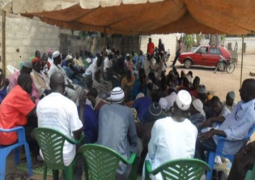Hello readers and welcome to another edition of the environment, your weekly column that brings environmental issues to the lime light.
In our today’s edition we try to link agricultural practice in the protection and conservation of the environment and the possible recommendations to be administered in our drive to achieve house hold sustainable food security, thus curb the importation of rice and other agricultural products to feed our people.
As a result, we had an exclusive interview with Mr. Falalo M Touray, deputy director general of agriculture at the Department of Agriculture on the relationship between agriculture and the environment and possible measures to be taken.
According to Touray, the agriculture sector is one of most destructive sector to the environment but was quick to add that the agriculture and natural resources sector also has the highest potential in addressing environmental problems in the country; with over 70% of the populace directly employed by the sector and provides almost 30% of the GDP, and feeds about 75% of the populace.
One of the eminent problems, he said, is the rapid population growth at a rate of 2.8% (2003 census) and some other farming methods and techniques. As the population pressure evolves, more forest cover are cleared to meet demanding need for shelter and agricultural purposes.
He noted that some of the problems are caused by anthropogenic activities, which needs to be stop, if we as a country are going to successfully protect and conserve the environment to optimize agricultural productivity and production.
“Some of these problems include cultivation methods and techniques bush fires, deforestation, poaching and poor waste management among others,” he stated.
“As an agrarian country, we must adopt and use best farming practice and techniques to avoid causing havoc on the environment. This is in our own interest and in the interest of the nation for the linkage between the environment and livelihood is not in doubt,” Touray noted.
He further pointed out that climate change is one of the major challenges that hamper agricultural development in Africa especially in West and Central Africa; and a change in long-term weather conditions could affect our food security endeavours.
“Environmental crises could lead to drops in production of food crops and also in livestock feed chain, thus climate change makes such crisis recurrent now becoming one of the biggest global problem faced on daily basis”, he said.
Environmental degradation, according to Touray, may affect agricultural productivity such as food availability, food accessibility, food utilization and food systems stability. This, he went on, have direct impact on the human health, livelihood assets, food production and distribution channels, as well as changing purchasing power and market flows.
According to experts, if not properly addressed, its impacts will be both long and short term, resulting from more frequent and more intense extreme weather events, and changing temperatures and precipitation patterns and would adversely affects productivity and production.
If steeps are not taken to address climate change issues, he said, it is feared that vulnerable people in terms of food insecure are likely to be the first set to be affected, and agriculture-based livelihood systems vulnerable to food insecurity may face risk of increased crop failure, new patterns of pests and diseases among others.
“As an indirect effect, low-income people everywhere, but particularly in urban areas, will be at high risk of food insecurity owing to drop in agricultural productivity and production which could lead to shifting vulnerabilities,” he added.
Touray deplored the current exploitation trend of forestry, fisheries and agricultural resources. He called this trend unreasonable and unsustainable in the long term and called for a judicious and sustainable use of the natural resource to ensure a better livelihood for ourselves, our children and our children’s children.
He stated that with the use of recommended best agricultural practices and techniques such as agro-forestry, ally cropping, integrated crop and livestock production management, efficient use of farm mechanization, re-forestation, and soil and water management among others guided by policies with judicious use of natural resources, a better environment and livelihood for all will be ensured.
Touray noted that since as people are central in environmental destruction and degradation, then we must be part of the equation for addressing the problem, meaning we must also take the center stage to find and implement solutions. In this process some of the areas requiring urgent attention are:-
• Sensitization and awareness campaigns, some of the factors could result in more local responsibility for food security,
• Mainstreaming environmental issues in sub-sectoral, sectoral and national plans
• Strengthening and enforcing legislative measures where they apply
• Support Village District, Regional and National but viable Environmental clubs, groups and societies
• Promote best Agricultural and environmental friendly principles, techniques, methods and procedures
• Use of adaptation and mitigation measures among others
He highlighted that some of these points needs to be considered in the formulation of adaptation strategies not only to be abreast of causes of environmental problems but also to find solutions to address it.
For your comments, suggestions, contributions please contact (00220) 6361340 or 7142236 or Email: bajgambia2011@gmail.com




